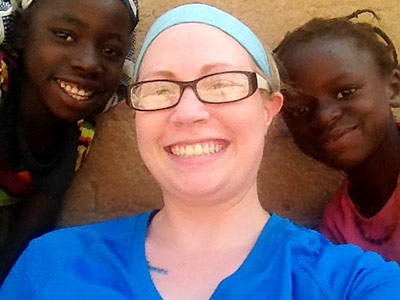
For Briana Mingus, the fight against once of the world’s most deadly killers begins with a bike ride.
Mingus, a 2014 Elmhurst graduate from Moweaqua, Illinois, is at the start of a 27-month stint with the Peace Corps in poverty-plagued Burkina Faso, where she is training as a community health worker to fight the spread of communicable disease. Mingus’s assignment is to educate Burkinabé (as residents of the West African nation are known) about nutrition and the prevention of communicable diseases like malaria, which caused more than half a million deaths worldwide in 2013, according to the World Health Organization.
Mingus and her fellow volunteers in Sanga, a village of about 7,000, begin most of their work days the same way: with a six-mile bicycle-powered commute to the Peace Corps training center in nearby Lèo, in Burkina Faso’s forested south, near its border with Ghana. The ride takes them through remote countryside on cratered dirt and sand roads in tropical heat.
And Mingus wouldn’t have it any other way.
“There’s nothing better than the joy on a little kid’s face when I ride by on my bike and smile and wave,” she wrote in a recent email. Each night, upon her return to the hut where she lives as the guest of an extended family, she finds that one of the family’s 16 daughters has left her a bucket of warm water for bathing. “That’s particularly nice after biking 12 miles in one day.”
The fight against malaria is especially critical in Burkina Faso and other West African nations, where the disease takes its greatest toll. Those nations account for nearly 90 percent of worldwide death related to malaria.
Mingus practices what she will preach about preventing the disease. She sleeps each night under a mosquito net and is scrupulous about taking her daily dose of Doxycycline, an antibiotic prescribed for malaria prevention. Once she completes her three-month training course, Mingus will work out of the community health center in Rondo, about 100 miles north of Burkina Faso’s capital city, Ouagadougou, where she will be tasked with teaching life-saving disease-prevention habits.
Her work will give her the chance to use the French language skills she began developing as an Elmhurst student. She is also learning Mooré, one of the many languages spoken in the country. But for all the challenges of penetrating the language barrier, Mingus has found that communicating with friends back home can be even more difficult, because WiFi is “pretty nonexistent” and 3G coverage spotty in her corner of Burkina Faso. She carried on an electronic conversation with a reporter by sending and receiving emails on an iPhone 4s illuminated by a Ugandan-made solar lamp. She has no access to electricity in Sanga.
Mingus knows the months ahead will test her.
“They say Peace Corps is the hardest job you’ll ever love,” she said. “I’m really enjoying life here, but I know it’s going to get harder.”
Mingus has wanted to join the Peace Corps since she was a girl growing up in central Illinois. Driven by a desire to help people in need, she joined the Peace Corps just months after her graduation from Elmhurst. But her stint in Africa is not her first time living overseas. As a sophomore at Elmhurst, she spent five months in London, working as an intern in the office of Roberta Blackman Woods, a Labour Party Member of Parliament for Durham. The political science major’s duties included responding to constituent mail; she was pleased to have a front-row view of the inner workings of Parliament.
Her newest job is a very different one. But just weeks into her Peace Corps service, Mingus says she remains ready for whatever trials it brings. “The Peace Corps really stresses not setting expectations,” she said “I’m going to try to roll with the punches as they come.”